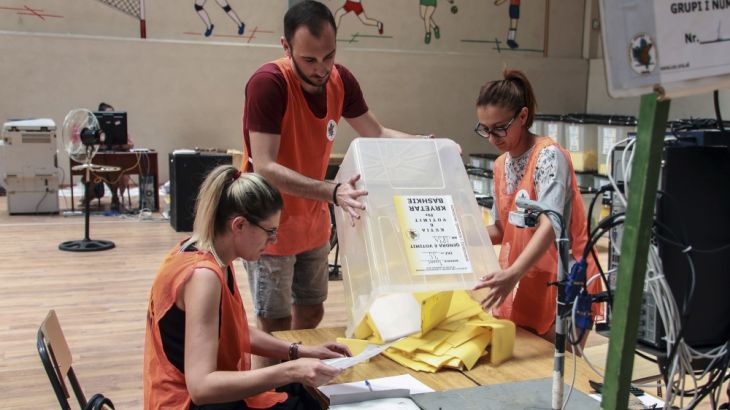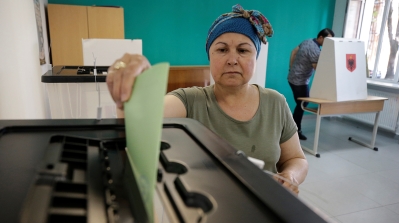A disputed election leaves Albania’s democracy in tatters
Ballot monitors say Albanian voters ‘did not have a meaningful choice’ in Sunday’s local elections.

Shkoder, Albania – International monitors say Albania’s local elections “were held with little regard for the interests of the electorate”.
The critical preliminary assessment on Monday came from Ambassador Audrey Glover, who headed the mission from the Organisation for Security and Cooperation in Europe (OSCE).
Keep reading
list of 4 items‘Absolute power’: After pro-China Maldives leader’s big win, what’s next?
Solomon Islands pro-China PM Manasseh Sogavare fails to secure majority
Pro-China party on course for landslide victory in Maldives election
“The opposition decided not to participate, and the government determined to hold the elections without it. In the climate of a political standoff and polarisation, voters did not have a meaningful choice between political options,” Glover said.
The OSCE mission will take two months to gather allegations of electoral fraud or misconduct, but some are already beginning to emerge.
In the northern city of Shkoder, near the border with Montenegro, Mayor Voltana Ademi told Al Jazeera she collected evidence of electoral commissioners voting on people’s behalf.
|
|
“The commissioners called families and individuals and people they know and they asked for ID cards … to fill the [ballot] papers they had and to vote for them. And they signed for them on behalf of them,” Ademi said.
Ademi said she believes state employees in schools and hospitals, as well as the police and civil service, were coerced into voting.
“They had to vote to be obedient to an order given to them,” she said. “They did a photo of their vote and they have voted but on the other side they have written that, ‘yes, we were ordered to do it’.”
Low turnout
Since the fall of communism in 1990, Shkodra has been a stronghold of the Democratic Party, now in the opposition. Since the Democrats boycotted the election, on Sunday a candidate from the ruling Socialist Party stood here unopposed.
If the government did coerce state employees to vote, such tactics were largely ineffective. According to the electoral commission, fewer than 10 percent of registered voters turned out to vote, and fewer than seven percent according to a municipal tally.
“People – they refused and this is wonderful. This is not political, this is being a citizen and because of that I feel happy today,” Ademi said.
Although the outcome of the election was not in doubt – Socialist candidates stood unopposed in 31 municipalities and against weak opponents in the other 30 – voter turnout suggests the government did not motivate even its own base.
Even in Socialist strongholds such as the capital, Tirana, and the port city of Vlore, turnout was just 26 and 21 percent, respectively.

Fractured politics
The low turnout is a setback to the personal prestige of Socialist Prime Minister Edi Rama, who ignored a decree issued by President Ilir Meta cancelling the June 30 election and another rescheduling the vote for October 13.
“We have to face it, these elections in terms of what they should have been were not the best for the country,” Rama told Al Jazeera in an exclusive interview on election day.
He blamed the opposition, which has boycotted parliament since February and launched street demonstrations in a bid to unseat Rama, who said he has written seven times to Democratic Party leader Lulzim Basha, requesting a dialogue.
“The best thing for the opposition to do is to reflect upon it and understand that politics is about ideas and leadership, it’s not about violence and obstruction. Because, yes, you can harm the country but you cannot win anything,” Rama said.
Basha, who considers Rama’s government corrupt, is furious the United States and European Union seem to have sided with Rama in seeing the local elections as legitimate.
“This is a very dangerous situation,” Basha told Al Jazeera.
“Feeling betrayed by the very institutions whose values Albanians aspire to is a very dangerous development. And it will potentially lead to civil unrest, social unrest … if there is not a clear condemnation of the farce that has already happened.”
The EU question
Albanians on both sides of the political divide seemed nonplussed at having to puzzle out a constitutional conundrum.
“It is the right of all citizens to vote. I don’t involve myself in politics too much and I don’t really know what the president said, but we had an election today and I came to vote,” seamstress Majlinda Beciraga, who voted for the Socialist Tirana mayor on Sunday, told Al Jazeera. “If there’s another election, I’ll vote again.”
Lawyer Mirlinda Colago, who has never voted for the Socialists, said Sunday’s election damaged Albania’s image as it strives to open membership talks with the EU.
“The EU integration process basically is about standards, it’s about respecting rules, having a normal country, being governed by a normal government. In all the international newspapers you can see that the Albanian mafia is governing Albania. So this is really a terrible situation,” Colago said.
Parliament member Rudina Hajdari blamed the post-communist generation of politicians for driving democracy to dysfunction.
“This is a crisis of a political class that has been fighting over the last 30 years to keep going in power,” she said.
“We really need to keep focused to show that we are ready to enter the EU and we are going forward as a country. But the political crisis taints this picture when you see violent protests and a political class that doesn’t seem to have a common language.
“Voters feel unrepresented by the political class,” she added.
Constitutional crisis
President Meta said only Albania’s constitutional court can decide whether he had the right to cancel the June elections.
That court is not expected to reconvene until the autumn, because most of Albania’s judges are suspended pending the conclusion of an investigation into their finances. The vetting is part of a judicial reform Rama’s government passed with EU and US support.
But mayorships formally conclude on August 13, and two dozen opposition mayors refuse to yield their town halls to the winners of Sunday’s election because they do not recognise its legality. Rama intends to enforce the result.
“I don’t wish them to ridicule themselves to that point, but if they do, it will be their problem,” he told Al Jazeera. “This cannot happen and, of course, if it happens they will have to face the law.”
Ademi said Shkoder’s prosecutor has already begun proceedings against her that could lead to her arrest and imprisonment.
“In the moment where we are, the voice has to be taken by people and the movements have to be taken by people. As politicians, we have done everything we had to do,” she said.
“If the citizens of Shkoder refuse to have a regime, they will find a way to the end, to fight the regime.”